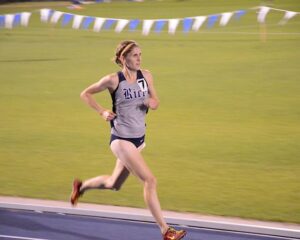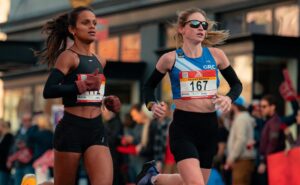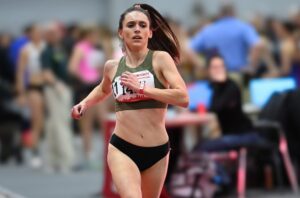
By Alison Wade
A few miles into last week’s Philadelphia Marathon, Amber Zimmerman decided to tuck in behind some taller competitors, to help shield her in the cold and windy conditions. In doing so, she broke away from the lead women’s pack. Zimmerman went into the race wanting to take risks, and she did, going through halfway in 1:13:25, her second-fastest half marathon ever. And though she faded a bit when she hit headwinds in the second half, she held off a fast-closing Maegan Krifchin to win the race by six seconds, in 2:31:25.
The time was a five-minute personal best, and it was thrilling for Zimmerman, who lives in Philadelphia, to win at home. A couple of her friends had flown across the country to see her and run the accompanying half marathon. “I’ve had a ton of people reach out and say it’s great to see a Philadelphian win,” she said. “And having [friends] there at the finish was a big deal for me. I don’t win a lot of races, so just winning was a lot of fun.” Zimmerman earned $10,000 for the victory and an additional $1,000 for being the first local across the line.
She dedicated her race to her dog, Donut, whom she calls “the light of my life.” Donut is an Australian cattle dog, but he’s more of a recovery buddy than a training partner. “I was told by the shelter that he was going to be very high energy, but he is quite the opposite,” she said. “He actually is terrified of everything, so he will occasionally go a couple of miles, but most of the time, he just likes to lie inside by himself.”
In that regard, Donut is the opposite of his owner, who rarely slows down. Zimmerman, 30, is currently doing postdoctoral work in the Division of Sleep Medicine at the University of Pennsylvania and the Division of Human Genetics at the Children’s Hospital of Philadelphia. She studies the genetics underlying sleep and psychiatric disorders. Zimmerman works long hours, and until last week, she kept her running separate from her work.
Winning the Philadelphia Marathon and making the local news outed her to her colleagues. They knew she ran—they had seen her go running at conferences—but they didn’t know she raced, or how fast she was. In the past, she had professors who thought her running career would detract from her research. “I didn’t really tell anyone when I moved out here, because I didn’t want them to think I didn’t take my research seriously,” she said. But all of her colleagues in Philadelphia have been very supportive since learning about her double life.
Going all in
Zimmerman struggled when she moved to Philadelphia in June 2021 for work. Her father, who has some cognitive impairment and mental health challenges, had been scammed out of his retirement and savings and was experiencing homelessness. She took him in and tried to help him find housing and other essential resources, while she was finding her bearings as a postdoctoral fellow. It was a lot more difficult than she expected.
It was a very challenging time for the whole family, but Zimmerman’s sister ultimately stepped in to help, and he’s doing well now at a senior living facility in Utah. And he was thrilled to learn about Zimmerman’s marathon win. “He sent the articles to everybody in my family and I got a lot of support from them,” she said.
Zimmerman realized while going through that experience with her father that she needed to prioritize her own mental health. “Every morning, it just seemed like I needed to run more and more miles to quiet my mind,” she said. She decided to double down on her commitment to her running and her work. She runs between 80 and 110 miles per week, a huge jump from her early college years, when she often ran only 10 miles per week due to injury.
In Philadelphia, Zimmerman trains almost entirely alone. She is self-coached and likes it that way. She does all of her running in the morning, before work, which usually means going out around 5:00 a.m. That’s part of the reason she runs alone. “It’s really hard to find people who will consistently run with you before 6:00 a.m.,” she said. “A lot of the more elite women here train in the evening.”
Fighting injury
Zimmerman started running at age 7 but began as a sprinter. She also did baseball, softball, volleyball, and basketball, but she found that her favorite part of most sports was the running. She also chose running because it was the most affordable. She was a good athlete and while at the Webb School, she won enough Tennessee state titles in cross country and track & field that she can’t remember the exact number. She experienced a growth spurt her junior year of high school, which led to a lot of injuries. A DEXA scan revealed that she had low bone density. (She hasn’t done a follow-up test, but she assumes her bone density has improved based on how she is handling high-volume training now.)
She spent three years at the University of Tennessee, where she had a series of stress fractures. She wasn’t able to run much, but she tried to make up for that through cross training. “I had an issue with overdoing it,” she said. “Trying to train at an elite level when you’re constantly tired is a really good way to put yourself in a hole.”
She graduated from Tennessee in three years, and then went to the University of New Mexico for two years, to use her remaining eligibility. She was concerned about running for a school where the athletes ran higher mileage, but coach Joe Franklin convinced her to give it a try. She was eventually able to handle 60–65 miles per week, and she thinks running on soft surfaces helped. Zimmerman helped New Mexico finish third at the 2014 NCAA Cross Country Championships, but she describes her collegiate running as “sub-par.”
By the time she finished her eligibility in 2015, Zimmerman was ready for a break. “Collegiate running just really wore me down and I didn’t ever do well, so it was a little bit disappointing,” she said. “Because I cross trained so much throughout college, everyone was like, ‘You should be a triathlete.’ Ultimately I got talked into it.” Zimmerman found that at the local level, she could make up for her weaker swim and bike on the run. She quickly earned her pro card, but because she was competing in super sprint triathlon, which only had a 1500m run, it was impossible to make up enough time. “I realized I’m just a good runner and I’m not a great triathlete, so I should just let that go,” she said.
While getting her Ph.D. in biomedical sciences from New Mexico, Zimmerman also tried mountain races, trail races, and snowshoe racing. She won her first ultra, the 2018 Silverton 55K, in a course-record time. She’s mainly focusing on the roads for now, partially because of her move to Philadelphia, but she’d love to return to trail and ultra running at some point. “It’s not the same kind of competitive environment as road racing,” she said. “But the people are so awesome in trail running, and the snacks are so much better.”
Having qualified for the U.S. Olympic Marathon Trials, which will be held in February 2024, Zimmerman doesn’t think she’ll run any ultras before the Trials, but she’d love to work up to running a 100-miler eventually. “I can suffer, but suffering for 26 miles is very different than suffering for 100,” she said.
From 10 miles per week to 110
Zimmerman made her marathon debut at the California International Marathon in 2018, where she hoped to run 2:45:00 or faster and qualify for the 2020 Olympic Trials. She hit a wall around 20 miles in, but she was still on pace until just over a mile to go. She struggled to the finish, running 2:46:07 (2:45:54 chip time). It was an excellent marathon debut, but not enough to get her to the Trials.
She thought she’d try again before the 2020 Trials, but she struggled with terrible headaches in 2019 and couldn’t race. Then racing stopped altogether during the pandemic. But Zimmerman began to feel better, and she discovered that she was a sucker for virtual challenges. She started with the Yeti Challenge, running five miles every four hours for 24 hours. Then she did one that involved running as many miles as possible in 10 days, then as many miles as she could run in five weeks. (She did more than 500.) In the process, she really began to enjoy running again, and she realized her body could handle a lot more mileage than she previously thought.
How did someone who could manage only 10 miles per week for parts of college adjust to running so much more? She thinks the biggest factor is that she slowed her easy runs way down. “My easy runs have gotten progressively slower, and I’ve gotten progressively faster,” she said. She does at least 80 percent of her mileage at an easy pace, usually around 8:30 per mile, when she used to shoot for 7:00 pace.
Slowing down on her recovery days allowed her to run a lot faster on her workout days. Her coaches had been on her case to slow down for years, but understanding the science behind it helped convince her to listen. “I like to read a lot on glucose utilization and mitochondrial adaptation and nerdy things like that, to see how your body adapts at different paces and why those paces are important,” she said. “And I think understanding that at an actual cellular mechanistic level has helped me to validate what I’m doing.”
Zimmerman loves to listen to science podcasts on her recovery days, which also helps keep her pace in check. “I’d like to give a solid shout out to This Week in Virology, because they have gotten me this far,” she said. “I’m pretty sure I would not be the runner I am if it were not for their podcast.” Her other favorites? This Week in Neuroscience, Stuff You Should Know, and No Stupid Questions.
As someone who studies sleep, Zimmerman considers it to be an important element of her training. She shoots for 8.5–9 hours per night. She says having a consistent sleep schedule helps, as does trying to treat it as something that’s enjoyable. “I think a lot of people think of sleep as a chore, but it’s like the best gift ever,” she said. “It’s like a hobby of mine. I don’t understand how people don’t love just lying in their bed and going to sleep. I think people need to change their attitudes about sleep and not think of it as a time when they’re not doing anything, because it’s really important.”
Marathon breakthrough
It took nearly three years for Zimmerman to run her second marathon. She returned to the distance at the 2021 Boston Marathon, the October edition of the race that usually takes place in April. She was certain that after putting in so much training she would be a better marathoner. But the downhill start trashed her legs, and six miles in, she knew it was going to be a rough day. She was aiming for 2:40 but ran 2:46:10, slower than her first marathon.
Zimmerman knew her fitness was better than that, so three months later, she ran the Houston Marathon and for the first time, she felt like she executed a marathon well. She ran almost even half marathon splits (1:18:06, 1:18:20) and finished 17th in 2:36:26, which qualified her for the Olympic Trials.
Philadelphia was only Zimmerman’s fourth marathon, and she feels like she’s just beginning to figure out the distance. She was shooting to go under 2:28, the Olympic standard, in Philadelphia, and she’ll likely try to do so again in 2023. She’d eventually like to get down to the mid-2:20s, and maybe even faster. “If I can figure out how to stop the cramping in the last five miles, I’ll probably be a lot better,” she said. “For the Olympic Trials, if I have a time that’s under 2:28, it’s anybody’s game if the conditions are harsh. It’s not always a speed game. I’m not going to count myself out. I’m sure a lot of people are like, ‘Who is this crazy girl? She’s barely a runner.’ But I’d like to give myself the best shot to make an Olympic team. Why not?”






